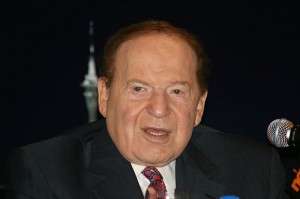Ron Paul Verbally Torches Anti-Online Gambling Bill
It should be no surprise that former Congressman Ron Paul supports online poker. He has spoken out for the pastime plenty of times before. Although to be more accurate, it is not necessarily that he likes online poker, it is just that he believes the United States government should not get in our way should we want to play. His latest rant comes straight from his site, RonPaulInstitute.org, where he lambastes Sheldon Adelson, his cronies, and the Restoration of America’s Wire Act bill (RAWA).

Sheldon Adelson
The essay, titled “Internet Gambling Ban: A Winner for Sheldon Adelson, A Losing Bet for the Rest of Us,” was published Sunday and just goes off on Adelson and those trying to help him get his anti-online gambling bill through. Paul starts by defining “cronyism” as something where “politicians write laws aimed at helping their favored business beneficiaries” and laments the fact that even though the general public hates cronyism, it continues unabated.
He then brings up RAWA, not by name, but that is not important. What he does do is use as many words as he can to bring the hammer down on Adelson, saying, “It is an open secret, at least inside the Beltway, that this legislation is being considered as a favor to billionaire casino owner, Sheldon Adelson. Mr. Adelson, who is perhaps best known for using his enormous wealth to advance a pro-war foreign policy, is now using his political influence to turn his online competitors into criminals.”
Ron Paul continues:
Supporters of an Internet gambling ban publicly deny they are motivated by a desire to curry favor with a wealthy donor. Instead, they give a number of high-minded reasons for wanting to ban this activity. Some claim that legalizing online gambling will enrich criminals and even terrorists! But criminalizing online casinos will not eliminate the demand for online casinos. Instead, passage of this legislation will likely guarantee that the online gambling market is controlled by criminals. Thus, it is those who support outlawing online gambling who may be aiding criminals and terrorists.
Paul adds that even though RAWA would reverse legalized gambling in Nevada, Delaware, and New Jersey, some of the bill’s supporters say that the law would somehow protect states’ rights. The reasoning: states that have laws banning online gambling could see those laws undermined if their residents are able to get online in another state.
Paul goes at that one:
Even if the argument had merit that allowing states to legalize online gambling undermines laws in other states, it would not justify federal legislation on the issue. Nowhere in the Constitution is the federal government given any authority to regulate activities such as online gambling. Arguing that “states rights” justifies creating new federal crimes turns the Tenth Amendment, which was intended to limit federal power, on its head.
There may be online gambling opponents that truly have a moral objection to the activity (we won’t debate that opinion here), but Ron Paul argues (correctly) that RAWA has absolutely zero to do with morality. “It is about whether Americans who do gamble should have the choice to do so online, or be forced to visit brick-and-mortar casinos,” he wrote.
He adds that even if in some fantasy world there was something more immoral about gambling online compared to a brick-and-mortar casino, “prohibiting behavior that does not involve force or fraud has no place in a free society.”
Ron Paul concludes by taking his argument close to the deep end, claiming that the passage of RAWA would start the dominoes falling, leading to the government spying on everything we do online (though many would that’s already happening. He finishes:
The proposed ban on Internet gambling is a blatantly unconstitutional infringement on our liberties that will likely expand the surveillance state. Worst of all, it is all being done for the benefit of one powerful billionaire. Anyone who thinks banning online gambling will not diminish our freedoms while enriching criminals is making a losing bet.
Ron Paul was a member of the Republican Party for most of his tenure in Congress, but that was more a marriage of convenience. He is best known as an outspoken supporter of Libertarianism, wanting the government to essentially stay out of the lives of citizens. He has said, “….the proper role for government in America is to provide national defense, a court system for civil disputes, a criminal justice system for acts of force and fraud, and little else.”
Ron Paul was the Libertarian Party’s candidate for President in 1988, receiving only 0.5 percent of the total votes. Though he was never on the ballot in the general election, he made greater waves in 2008 when he sought the Presidential nomination for the Republican Party as he was able to build more grassroots support with the help of the internet and social media. He ran again in 2012, this time doing quite well in early primaries before finally having to drop out of the race.



















COMMENTS